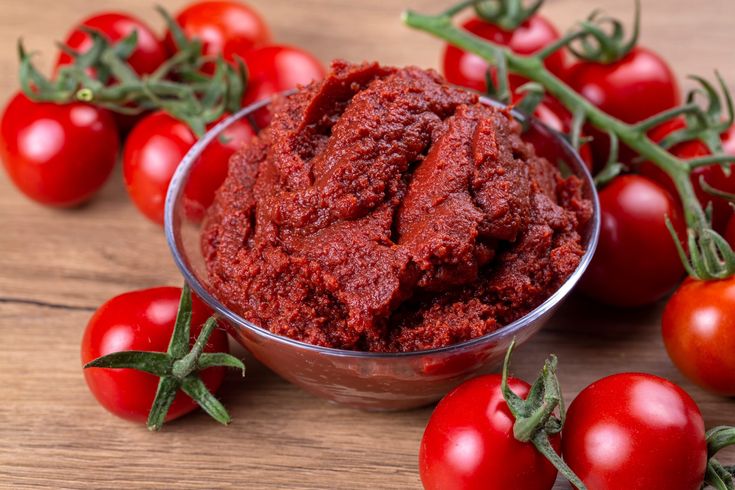Categories
The latest content
-

Customs Clearance & Import Regulations for Bulk Iranian Pinto Beans in EU, Middle East & Africa
..
-

Quality Control & Laboratory Testing Standards for Iranian Pinto Beans
..
-

Logistics & Shipping Solutions for Bulk Iranian Pinto Bean Exports
..
-

Minimum Order Quantity (MOQ) & Bulk Pricing for Iranian Pinto Bean Buyers
..

Tags
Customs Clearance & Import Regulations for Bulk Iranian Tomato Paste in EU, Middle East & Africa

Exporting tomato paste in bulk from Iran to international markets is not only about production quality—it’s also about ensuring smooth customs clearance and regulatory compliance. Each importing region, from the European Union to the Middle East and Africa, has specific rules on food safety, labeling, tariffs, and documentation.
For global importers and distributors, understanding these import regulations is critical to avoid costly delays, rejected shipments, or compliance penalties.
1. Why Customs Clearance Matters in Tomato Paste Trade?
Customs clearance acts as the gateway between Iranian suppliers and international buyers. Even with high-quality tomato paste, failure to meet import regulations can result in:
• Delays at ports.
• Additional storage and demurrage costs.
• Product recalls or rejections.
• Long-term damage to supplier credibility.
By working with experienced exporters like Tamila Agrifood, importers gain confidence that shipments comply with all required standards.
2. Customs & Import Regulations in the European Union (EU)
The EU is one of the most regulated food markets in the world. Importers of Iranian tomato paste must comply with:
• Tariff Codes (HS Code 200290): Determines applicable import duties.
• Food Safety Regulations: Compliance with EU Food Law, EFSA (European Food Safety Authority) standards, and Codex Alimentarius.
• Laboratory Testing Requirements: Checks for pesticides, heavy metals, mycotoxins, and microbiological safety.
• Packaging & Labeling Rules: Nutrition facts, allergen information, expiry date, and country of origin labeling.
• Certificates of Analysis (COA): Must be presented for each batch.
• Organic Imports: Must be certified under EU organic standards for specialized markets.
Failure to meet EU customs rules can lead to strict penalties, so precision and compliance are non-negotiable.
3. Customs & Import Rules in the Middle East
The Middle East represents one of the largest consumer markets for Iranian tomato paste, especially in GCC countries, Iraq, and North Africa. Importers must prepare for:
• Halal Certification: Mandatory across GCC and Islamic markets.
• GCC Standardization Organization (GSO): Regulates food labeling, shelf life, and additives.
• Customs Documentation: Commercial invoice, packing list, bill of lading, and certificate of origin.
• Cold-Chain Logistics: In certain regions like Saudi Arabia or the UAE, controlled temperature transport may be required.
• Import Duties & Tariffs: Often lower for regional trade partners, making Iranian tomato paste highly competitive.
Buyers in this region value flexibility in packaging and competitive pricing, but customs clearance still requires precise compliance with regional rules.
4. Import Regulations in Africa
Africa’s growing food and beverage industry makes it an emerging market for Iranian tomato paste. However, each country has unique import frameworks:
• Nigeria & West Africa: Compliance with NAFDAC regulations for food imports.
• South Africa: Strict food labeling and product registration under Department of Agriculture, Forestry & Fisheries (DAFF).
• North Africa (Egypt, Morocco, Algeria): Adherence to local food safety ministries and halal standards.
• Documentation Requirements: Certificate of analysis, phytosanitary certificate, and conformity assessments.
While tariffs can vary, Iranian exporters benefit from cost efficiency and proximity to African markets, making customs compliance a manageable yet essential step.
5. Documentation Needed for Smooth Customs Clearance
To avoid shipment delays, importers and exporters must ensure the following documents are prepared:
• Commercial Invoice.
• Packing List.
• Bill of Lading or Airway Bill.
• Certificate of Origin (often Chamber of Commerce issued).
• Phytosanitary or Health Certificate.
• Certificate of Analysis (COA) from accredited laboratories.
• Relevant Certifications (Halal, Organic, HACCP, ISO).
Proper documentation can significantly reduce customs clearance times.
6. How Tamila Agrifood Ensures Hassle-Free Customs Clearance?
At Tamila Agrifood, we understand the complexity of cross-border trade. Our team ensures:
• Pre-shipment compliance checks with EU, Middle Eastern, and African regulations.
• Collaboration with certified laboratories for reliable testing.
• Provision of all necessary documentation before shipping.
• Custom-tailored solutions for each market, whether it’s EU labeling or Halal certification for GCC buyers.
This approach helps importers avoid unnecessary risks and ensures timely, hassle-free delivery.
7. Conclusion
Customs clearance and import regulations are critical pillars in the bulk export of Iranian tomato paste. From the strict EU food laws to Halal requirements in the Middle East and conformity checks in Africa, importers must navigate multiple regulatory landscapes.
By partnering with Tamila Agrifood, buyers can rely on a supplier that not only provides premium Iranian tomato paste but also guarantees regulatory compliance, proper documentation, and seamless customs clearance.
Email: tamilaagrifood@gmail.com
Call / WhatsApp: +989141858935



